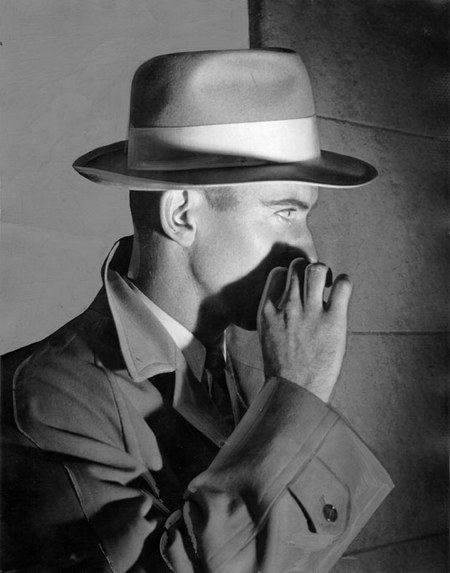In his 1991 autobiography, Reporters: Memoirs of a Young Newspaperman, Will Fowler recalled one of his colleagues, Baker Conrad, had noticed a telegram among Elizabeth Short’s belongings. The Examiner’s editor, Jim Richardson, dispatched Fowler to the address on the telegram, 8010 Mountain View Avenue in South Gate.
When Fowler arrived at the bungalow court, a strikingly beautiful young woman greeted him. Her name was Harriette Manley. Fowler let her believe he was a cop.
During their conversation, Harriette said her husband phoned her from San Francisco after he saw his name in the newspapers in connection with Elizabeth Short’s murder. Red reassured Harriette that he’d had nothing to do with the slaying. He said he “loved her more than any man ever loved his wife.”
At 10:00 pm on January 19th, two LAPD sergeants, J.W. Wass and Sam Flowers, staked out the home of Red’s employer in Eagle Rock. When the suspect’s sedan pulled up, the officers approached him with their guns drawn. An Examiner photographer was there to capture the arrest.

The next day, Aggie Underwood interviewed him. Red needed no encouragement to unburden himself. He told her how he’d picked Beth Short up on a San Diego street corner. How they had spent an “erotically uneventful” night in a motel and how he eventually dropped her off at the Biltmore Hotel on January 9th.
Red finished his tale with a heartfelt statement. “I’ll never pick up another dame as long as I live.”
Aggie believed Red and shared her gut feelings with the police. Red was forthcoming in his interview. Aggie knew he wasn’t a killer. Red was a frightened man with goofy ideas about love, marriage, and fidelity.

“I was only trying to test my love for my wife,” he said as he sought to explain his brief escapade with Beth Short.
Red said he first saw Beth standing on a street corner in San Diego while on a business trip ten days before Christmas. “She looked cute, so I thought, well, I’ll make a little test and see if I’m still in love with my wife, or whether I could ever fall for anyone else.”
According to Red, he and Harriette, married for just 14 months, were going through a “readjustment period.” He said they had a “few misunderstandings, but nothing important.”

He swore up and down that Beth was the only woman he picked up since his marriage. When he approached her that day, Beth was coy. “She turned to me and said, ‘Don’t you think it’s wrong to approach a girl this way?’” Wrong or not, she got into his car within a minute or two. Before he dropped her off in Pacific Beach, where she was couch-surfing at the home of Elvera and Dorothy French. they sat in his car and talked. He asked her if she would go out to dinner with him. “That would be nice,” she said.
Red drove back up the highway and rented a motel room. He picked Beth up that evening and they went to a nightclub and danced until midnight. Afterwards, they stopped at a drive-in for a snack. He said they talked for a few minutes in front of the French home. Red kissed her goodnight, but said she was a little cold.

He didn’t see her again until January 7, on his next trip to San Diego. He wired ahead to let her know he would be in town. They went nightclubbing again. Then they stayed together in a motel on their way back to Los Angeles.
Red’s story, and his demeanor, convinced Aggie he was not a killer, but that didn’t mean she let him off easy.
If there was one thing that Aggie detested, it was a sob sister. For those of you unfamiliar with the term, a sob sister is a female journalist who writes overly sentimental copy. That sort of journalism was never Aggie’s thing. She said, “A sob sister could have wept with and over Manley, interpolating, editorial gushes to prove what a big bleeding-heart beat in her breast. To hell with that. I’d rather have a fistful—an armload—of good solid facts.”

Her armload of facts made Aggie’s interview with Red Manley riveting. In fact, her city editor, who normally cautioned her to keep her copy short, let the entire interview run without a ton of photos. He knew a great interview when he read one. Aggie was the only Los Angeles reporter to get a by-line in the Dahlia case.
Why, then, amid the covering of the murder, was Aggie yanked off the story? With no warning or explanation, Aggie found herself benched. The city editor let her cool her heels in the newsroom without a thing to do.
Aggie spent a couple of miserable days at her desk, bored out of her mind. Then she got pissed-off enough to fight back. She didn’t get huffy or raise her voice. She brought in an embroidery project. In no time, the other newsroom denizens were snickering. One newswoman, Caroline Walker, said, “What do you think of that? Here’s the best reporter on the Herald, on the biggest day of one of the best stories in years—sitting in the office doing fancy work!”
The next day, they reassigned Aggie to the story—only to pull her off a second time. What the hell was going on?
NEXT TIME: The Black Dahlia case continues.
